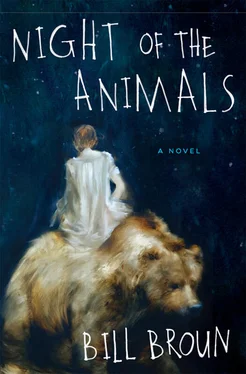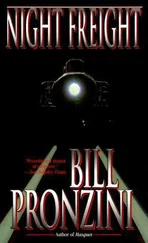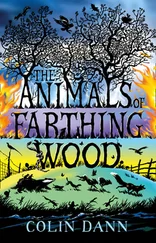“Ar. Tell Dr. Bajwa I’m. in the zoo. I’ve come for the otters and all.”
There was a coughing sound, then the woman said, “Excuse me, sir. What’s your name, sir?”
“Cuthbert Handley — savior of animals.”
“Um, well. Handley, is it? Can you spell that, surname first?”
Cuthbert did.
“You’re Dr. Bajwa’s patient?” she said. “This is an emergency? Dr. Sarbjinder Bajwa?”
“Arr, ma’am.” He was slurring again. “Tell him a’m in the zoo right now. Am yow g’ttin’ this?”
“It’s all going down,” said the woman. “I believe the doctor’s down in Kent for the weekend — flying his solarcopter or some sort.”
All at once, Cuthbert fell backward, pulling the bright yellow handset down with him. Such was his weight that the handset, cord and all, detached like an old banana picked off a bunch. The door of the box flung open and he found himself halfway in and half-out on the ground. He felt dizzy. He threw the phone away and got back to his feet, using his big cutters to help himself stand up, like a crutch.
“There,” he said. “It’s done.”
And then he heard them, reminding him of his task — the otters, surely:
Gagoga maga medu, gagoga maga medu,
Remeowbrooow, Cuthber-yeow,
Anglish water ish arg forever groad,
Cuthber-yik-yik-yik-yik, mray for rugrus!
Gagoga maga medu meant what? He did not know, he thought, and he might never know, but the rest he could work out. It meant, in otterspaeke, Remember, Cuthbert, English water is our forever road, St. Cuthbert pray for us! Three separate thoughts, gurgling and ungilled. It was the end of meaning at the moment just before drowning. For Cuthbert if for no one else, the nonsense meant exactly that there was still reason to hope in Britain in 2052.
“Arr, I’m coming,” Cuthbert said aloud. “Sweet, sweet boys, a’m coming at last.” He started walking again.
A police solarcopter’s spotlight found him and trained its shaky beam on his every move, and with the light from the heavens streaming down, Cuthbert reckoned time was running out.
He began to hobble along more quickly, toward the otters, but after a minute of pressing on like this, he found he was lost and out of the spotlight — his normal state, really. The solarcopter’s pilot was inexperienced and applied too much pressure to one of his rudder pedals, and the spotter lost Cuthbert and couldn’t seem to find him again, for now.
“Shit,” Cuthbert said. “Thank god.”
He wished he could find one of the zoo’s map-signs. He did remember that the otters were located at coordinates “2B,” which Cuthbert interpreted as a kind ontological code.
Through shivering lips, he said, “Or not to be — that’s the palaver.”
The air had turned frosty as a great western fold of stratus clouds finally scudded away for good.
Urga-Rampos had become shockingly visible. When Cuthbert saw it this time, it hit him like a kind of antibeatific vision. Its center showed feathering gradations of light, dozens of overlapping white petals. Its long arms had turned into two pallid, satanic horns. The comet itself seemed to be aiming straight for the ground, tearing the sky open. It looked constitutionally wrong for England. It was too big and showy and nocturnal, a multifoliate rose from an evil galaxy far away from the Milky Way. Nothing very English about that.
With one nostril missing, a body racked by Flōtism, insanity, and poverty, and his clothes in dirty, torn strips, Cuthbert faced the comet with what could be regarded as astonishing courage. He held his blood-caked fists up and shook them at the comet. He screamed, with a hoarse voice, “In the name of Saint Cuthbert! You’ve no right to come here!”
He fell down again, in exhaustion, on all fours, his bolt cutters clanking down, and said, “And we’ve got otters! Good English otters!” He was beginning to suffer acute liver failure. In fact, his skin was turning a sickly yellow-greenish hue, and Cuthbert’s life was ending.
At last, Cuthbert had become the Green Saint, just like the statue in the old churchyard where his grandfather’s grave was lost. He held a new power now to bring others, too, into his shimmering faith. He was the al-Khidr, the Mahdi, and now he knew it as much as he could know anything. He grasped, too, that his identity in England had always been written in the water of Dowles Brook, and in the songs of the otters since the Day in 1968 when he left the world and become someone else. Ever since, he had awaited this moment — this canonization.
St. Cuthbert the Wonderworker, the harbinger of a new animal Christ, had arrived.
LIKE MANY OF THE ENCLOSURES, the oriental small-claw otters’ exhibit was deceptively hushed at night. The otters’ nocturnal habits were only in part disrupted by the zoo’s diurnal cycle of daytime visitors and nighttime imprisonment. They remained active denizens of the dark and tended in the wee hours to inhabit parts of their enclosure not seen by zoo guests.
St. Cuthbert’s arrival was anticlimactic — at first. Much like at the Penguin Pool, he encountered no movement, no sound. On the sloped walls of textured concrete that made up the fake riverbank were tarry spraints of the animals, smeared and rubbed in by successive paws into marks that looked like a frenzied Sumerian cuneiform. The spraints released a strong, distinctive smell, like jasmine tea. The dung’s smell of wildness gave St. Cuthbert confidence and calmness, and he was quick to act on it. Gripping his bolt cutters by their foam handles, he bashed beak-like hardened steel blades against one of two thick glass panels, which allowed guests to view the otters’ underwater antics. The effort paid off instantly. A divot of glass popped out and water spouted out onto the walk. St. Cuthbert began jabbing the beak into the hole and easily worked open a gap as wide as a stove. Green water sluiced out in a roar, and St. Cuthbert stood back, staring fixedly and biting his lip. It took about two minutes for the entire enclosure to drain. The California comet aliens were everywhere now, swirling in the sky, screaming through crackling megaphones, roving the zoo to obliterate the souls of all living beings in Animalia. But St. Cuthbert, the water coursing over his feet, stood now in his little islet of English sacred reverie, his psychotic Lindisfarne.
The moment the water stopped rushing, the entire romp of the London Zoo’s small species of otter appeared and leaped down through the gap, pouring out in one quivering, shiny, river-bottom-colored whoosh. It was as though they were, together, the last and most precious thing in England to be emptied from it, a half-water and half-earth being made of golden-brown jewels and smelling of stolen foreign flowers. They were seven animals in all, with the huge and now fully pregnant female at the center of the family, swanning forward with a certain lumpy majesty. Two males, “on point,” as it were, and yikkering softly, fronted the romp, thrusting their noses out to smell for food and danger and water.
The big female turned to St. Cuthbert. He dropped to his knees. He slapped his hands onto the wet pavement of the walk. He thought he heard her say, “ Gagoga maga medu, ” but he couldn’t be sure, could he, really?
“I, I, I, I, b-b-b-b-b-beg you,” Cuthbert stammered, falling over and curling up. The cold air, combined with his withdrawals, was making his teeth chatter, his tongue turn to fluttering leaves. “Take away my — my — my sick head. It dunna work royt en- nay more.”
You have freed us , the otters said. Look at yourself, St. Cuthbert — and call for the Christ of Otters.
Читать дальше












